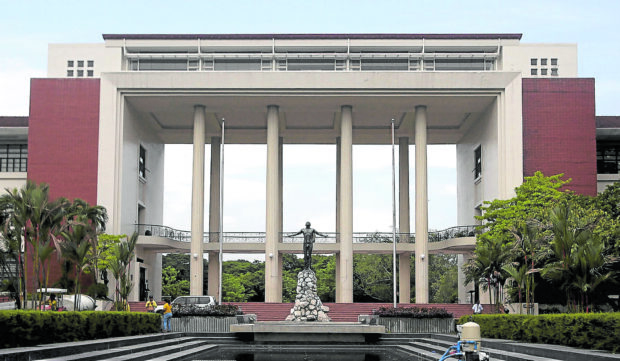
RESERVE FUNDING | State universities like the University of the Philippines in Diliman, Quezon City, which offer free higher education can use the available balance from the Higher Education Development Fund for their expenditures, according to Sen. Sherwin Gatchalian. (INQUIRER FILE PHOTO)
MANILA, Philippines — State universities and colleges (SUCs) may access more than P10 billion for their operations this year, Sen. Sherwin Gatchalian said on Tuesday, as he sought to allay concerns about possible budgetary constraints that could affect the implementation of the country’s free tertiary education program.
According to Gatchalian, the 2024 General Appropriations Act contains a special provision, which he previously proposed, allowing the SUCs to utilize the available balance from the Higher Education Development Fund (HEDF).
The P10.167 billion, he said, may cover expenditures in state-run institutions offering free higher education.
“We made sure that there would be enough funding for the free college education program in SUCs this year,” Gatchalian said in a statement.
“It’s important for us to ensure that SUCs will have sufficient resources to continue providing quality education to our college students,” he added.
Gatchalian said that the Philippine Association of State Universities and Colleges had earlier estimated that about 1.8 million students would avail themselves of free college education this year, possibly leading to a funding shortfall of P4.1 billion.
This could adversely affect plans by the SUCs to build more classrooms, laboratories and other facilities for their students, he noted.
Short-term solution
Citing records from the Bureau of Treasury, Gatchalian said that unused allotments from the HEDF had already reached P10.167 billion as of May 2022, adding that this was “enough to cover the funding gap for free higher education in SUCs for 2024.”
But he clarified that the HEDF would cover only free higher education deficiencies for fiscal year 2024.
As mandated by Republic Act No. 10931, or the Universal Access to Quality Tertiary Education, eligible students are exempted from paying tuition and other related fees in government-run institutions for tertiary education, including those offering tech-voc programs as well as academic establishments owned by local governments.Finance Secretary Benjamin Diokno, however, suggested last year that state subsidies be limited to students who pass a national test, adding that the current free college program had become “unwieldy, inefficient and wasteful.”
Senate Majority Leader Joel Villanueva, meanwhile, reminded the Commission on Higher Education (CHEd) to coordinate with the Department of Education (DepEd) regarding the order for the SUCs to stop offering senior high school programs (See related story on page A3). According to Villanueva, “it is imperative [that these agencies] consider the impact of this directive on affected students.”
“As such, we expect that there is sufficient coordination between DepEd and CHEd to ensure that there will be no disruption in the education of our students and that there is sufficient DepEd or private sector capacity to take it on,” he said.